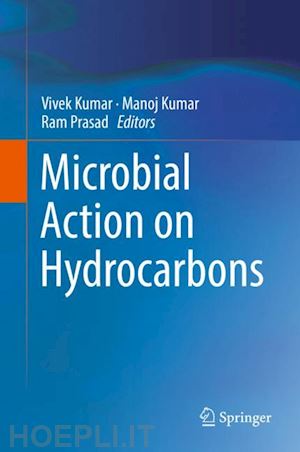
Questo prodotto usufruisce delle SPEDIZIONI GRATIS
selezionando l'opzione Corriere Veloce in fase di ordine.
Pagabile anche con Carta della cultura giovani e del merito, 18App Bonus Cultura e Carta del Docente
The book discusses ways to overcome the side effects of using hydrocarbon-based products as energy sources. Hydrocarbons produce raw crude oil waste of around 600,000 metric tons per annum, with a range of uncertainty of 200,000 metric tons per year. The various chapters in this book focus on approaches to reduce these wastes through the application of potential microbes, in a process called bioremediation. The book is a one-stop reference resource on the methods, mechanisms and application of the bio-composites, in the laboratory and field. Focusing on resolving a very pressing environmental issue, it not only provides details of existing challenges, but also offers deeper insights into the possibility of solving problems using hydrocarbon bioremediation.
Microbial Consortia and Biodegradation of Petroleum Hydrocarbons in Marine Environments.- Biosurfactants in Improving Bioremediation Effectiveness in Environmental Contamination by Hydrocarbons.- Bioremediation of Petroleum Hydrocarbon in Seawater: Oil Spill Plume Modelling Approaches.- Hydrocarbon Degradation Assessment: Biotechnical Approaches Involved.- Microbes and Petroleum bioremediation.- Microbial Degradation of Petroleum Hydrocarbons: Technology and Mechanism.- Biosurfactant Enhanced Petroleum Oil Bioremediation.- Modeling Applications in Bioremediation of Hydrocarbon Pollutants.- Biodegradation of Polycyclic Aromatic Hydrocarbons (PAHs) by Microbes Isolated from the Marine Sponge Biemna fortis (Topsent 1897) .- A Comprehensive Review on the Bioremediation of Oil Spills.- The Small-Scale Microbial Processes for Remediation of Sediments Contaminated with Hydrocarbons.- Enzyme Activities in Contaminated Soil with Hydrocarbons.- Microbial Degradation of Petroleum Hydrocarbons.- Microbial Bioremediation of Petroleum Hydrocarbon: An Overview.- Microbial Degradation of Hydrocarbons in the Ecosystem.- Microbial Degradation of Hydrocarbons in the Environment: An Overview.- Plant-Microbe Association for Bioremediation of Hydrocarbon Substrates.- Bioaugmentation of Petroleum Hydrocarbon in Contaminated Soil : A Review.- Petroleum Microbiology under Extreme Conditions.- Microbial Degradation of Petroleum Hydrocarbons: An Overview.- Oil Spill Removal by Mycoremediation.- Treatment of Oily Waste Water Using Hydrogels.- Biosurfactants Produced by Microbacterium sp., isolated from Aquatic Macrophytes in Hydrocarbon-Contaminated area in the Rio Negro, Manaus, Amazonas.- Novel and Cost Effective Technologies for Hydrocarbon Bioremediation.- Role of Filamentous Fungi to Remove Petroleum Hydrocarbons from Environment.- Petroleum Biodegrading Property of Microbial Consortia from a contaminated site.- The Role of Microbes towards Biodegradation of Hydrocarbons.- Hydrocarbon Degradation.- A Review on the Bioremediation of Petroleum Hydrocarbons: Current State-of-the-Art.
Dr. Vivek Kumar is an Associate Professor at the Himalayan School of Biosciences, Swami Rama Himalayan University, Jolly Grant, Dehradun, India and is leading the Plant-Microbe-Interaction and Microbial Ecology research group. He obtained his masters and doctoral degrees from CCS Haryana Agricultural University, Hisar, Haryana, India. He is an editor and reviewer of several respected international journals. He has published over a hundred research papers, book chapters and review articles. He has also authored one practical manual and edited several books with Springer Nature. Dr. Kumar also served as a microbiologist for eight years at the Department of Soil and Water Research, Public Authority of Agricultural Affairs & Fish Resources, Kuwait. He has been credited with the first reporting and identification of Pink Rot inflorescence disease of the date palm in Kuwait caused by Serratia marcescens. He has also organized a number of conferences/workshops as convener/ organizing secretary.
Dr. Kumar’s research areas include environmental microbiology, plant-microbe-interactions, and bioremediation. In 2002 he was awarded ‘Young Scientist Award’ in ‘Agricultural Microbiology’ by the Association of Microbiologists of India (AMI).
Dr. Manoj Kumar is currently working as an Associate Professor at the Centre for Life Sciences, Central University of Jharkhand, Ranchi, India and is leading the Plant Developmental Biology research group. Hepursued his PhD in Plant Biotechnology at the prestigious Jawaharlal Nehru University and was then awarded two consecutive postdoctoral fellowships: i) DBT-PDF from IISc Bangalore in 2005 and then NRF-PDF from University of Pretoria. His research interests focus on plant biotechnology and he is affiliated with Ton Duc Thang University, Vietnam. Until recently, he was a coordinator of the Bio-resource Chapter (Northern India) and served on the editorial boards of five international journals.
Dr. Kumar has published several research papers, books and review articles. He has also guided several research projects and collaborated internationally.
Dr. Ram Prasad is an Assistant Professor at the Amity Institute of Microbial Technology, Amity University, Uttar Pradesh, India. His research interests include plant-microbe interactions, sustainable agriculture and microbial nanobiotechnology. Dr. Prasad has published more than a hundred research papers, and reviews & book chapters and has five patents issued or pending, and edited or authored several books. Dr. Prasad has twelve years of teaching experience and was awarded the Young Scientist Award (2007) and Prof. J.S. Datta Munshi Gold Medal (2009) by the International Society for Ecological Communications; FSAB fellowship (2010) by the Society for Applied Biotechnology; Outstanding Scientist Award (2015) in the field of Microbiology by Venus International Foundation; BRICPL Science Investigator Award (2017); Award for Excellence in Research from 6th Academic Brilliance Awards-2018 and the American Cancer Society UICC International Fellowship for Beginning Investigators (USA, 2014). In 2014-2015, Dr. Prasad served as a Visiting Assistant Professor at the Department of Mechanical Engineering at Johns Hopkins University, USA and since 2017 has served as a Research Associate Professor at the School of Environmental Science and Engineering, Sun Yat-Sen University, China.











Il sito utilizza cookie ed altri strumenti di tracciamento che raccolgono informazioni dal dispositivo dell’utente. Oltre ai cookie tecnici ed analitici aggregati, strettamente necessari per il funzionamento di questo sito web, previo consenso dell’utente possono essere installati cookie di profilazione e marketing e cookie dei social media. Cliccando su “Accetto tutti i cookie” saranno attivate tutte le categorie di cookie. Per accettare solo deterninate categorie di cookie, cliccare invece su “Impostazioni cookie”. Chiudendo il banner o continuando a navigare saranno installati solo cookie tecnici. Per maggiori dettagli, consultare la Cookie Policy.